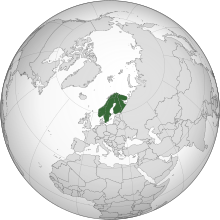Fennoscandia
 Fennoscandia in March 2002 | |
 | |
| Geography | |
|---|---|
| Location | Northern Europe |
| Coordinates | 63°N 17°E / 63°N 17°E |
| Adjacent to | Arctic Sea, Atlantic Ocean |
| Highest elevation | 2,469 m (8100 ft) |
| Highest point | Galdhøpiggen |
| Administration | |
| Mainland | |
| Mainland | |
| Mainland | |
| Whole or part of the mainland area of Murmansk Oblast, Republic of Karelia, and Leningrad Oblast | |
Fennoscandia (Finnish, Swedish and Norwegian: Fennoskandia; Russian: Фенноскандия, romanized: Fennoskandiya), or the Fennoscandian Peninsula, is a peninsula in Europe which includes the Scandinavian and Kola peninsulas, mainland Finland, and Karelia.[1] Administratively, this roughly encompasses the mainlands of Finland, Norway and Sweden,[2] as well as Murmansk Oblast, much of the Republic of Karelia, and parts of northern Leningrad Oblast in Russia.
Its name comes from the Latin words Fennia (Finland) and Scandia (Scandinavia).[3] The term was first used by the Finnish geologist Wilhelm Ramsay in 1898.[4]
Geologically, the area is distinct because its bedrock is Archean granite and gneiss with very little limestone, in contrast to adjacent areas in Europe.
The similar term Fenno-Scandinavia is sometimes used for Fennoscandia. Both terms are sometimes used in English to refer to a cultural or political grouping of Finland with Sweden, Norway and Denmark (the latter country is closely connected culturally and politically, but is not part of the Fennoscandian Peninsula), which is a subset of the Nordic countries.[5][6]
See also
[edit]- Baltoscandia – Geopolitical concept
- Cap of the North – Region in Northern Europe
- Scandinavia – Subregion of Northern Europe
- Sápmi – Cultural region traditionally inhabited by the Sami people
References
[edit]- ^ Cummings, Vicki; Jordan, Peter; Zvelebil, Marek, eds. (2014). The Oxford Handbook of the Archaeology and Anthropology of Hunter-Gatherers. Oxford; New York: Oxford University Press. p. 838.
- ^ Lavsund, Sten; Nygren, Tuire; Solberg, Erling (2003). "Status of moose populations and challenges to moose management in Fennoscandia". Alces. Archived from the original on 6 March 2007.
- ^ "Fennoscandia [fen′ō skan′dē ə]". Your Dictionary. LoveToKnow, Corp. Archived from the original on 21 October 2007. Retrieved 20 April 2015.
- ^ De Geer, Sten (1928). "Das geologische Fennoskandia und das geographische Baltoskandia" [The geological Fennoscandia and the geographical Baltoscandia] (PDF). Geografiska Annaler (in German). 10. Swedish Society for Anthropology and Geography: 119–139. OCLC 604361828. Archived (PDF) from the original on 23 April 2018. Retrieved 22 April 2018.
- ^ Bulletin – Canadian Library Association, volume 20, Canadian Library Association, 1963, p. 179
- ^ "Fennoscandia, n.". Oxford English Dictionary Online (2nd ed.). Oxford: Oxford University Press. December 2019. Archived from the original on 28 July 2020. Retrieved 10 February 2020.
Further reading
[edit]- Ramsay, W., 1898. Über die Geologische Entwicklung der Halbinsel Kola in der Quartärzeit. Fennia 16 (1), 151 p.
External links
[edit]
